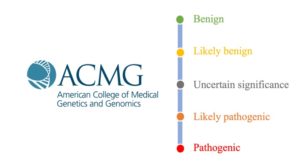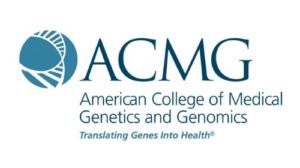CONTACT
We will reply as soon as possible.
Enevia Health, LLC
30 N Gould Ste N, Sheridan, WY 82801, USA
Sources:
American College of Medical Genetics and Genomics Website
In the world of genetics, the classification of genetic variants is a key process that helps healthcare professionals understand the potential impact of these variants on human health. This process is essential for making informed clinical decisions, including diagnosis, prognosis, and therapeutic interventions. Below, we will explain how genetic variants are classified and why some variants of uncertain significance (VUS) may not be reported in genetic test results.
Genetic variants are identified through genomic testing methods, such as sequencing. They are then named using standardized nomenclature, following guidelines established by the Human Genomic Variation Society (HGVS). This nomenclature provides a clear and consistent way of referring to each variant, based on its genomic location and the nature of the alteration (e.g., substitution, deletion, insertion).
Functional classification evaluates the impact of a variant on the function of the gene or protein. This can range from variants with well-understood effects on function to those for which the impact is uncertain. The evaluation may consider:
– Loss of function (LoF) variants): Which are expected to disrupt the function of the encoded protein, which can lead to diseases if the gene is haploinsufficient.
– Gain of Function Variants: That increase the function of a gene or confer new activity, possibly leading to diseases such as cancer.
– Variants that affect regulatory elements: Which can alter gene expression levels, potentially leading to diseases.
After evaluating the functional impact, the variants are classified based on their clinical relevance. This involves correlating the variant with disease phenotypes, considering evidence from clinical studies, family histories and population data. Classification categories typically include:

– Pathogenic: Variants with strong evidence supporting a causal relationship with diseases.
– Probably pathogenic: Variants with some evidence linking them to diseases, but not as strong as for pathogenic variants.
– Variant of uncertain significance (VUS): Variants for which there is insufficient evidence to determine their impact on diseases.
– Probably benign: Variants with some evidence suggesting they do not cause disease.
– Benign: Variants with strong evidence indicating that they are not associated with disease.
Several guidelines and systems have been developed to standardize the classification of genetic variants, including:
– Guidelines from the American College of Medical Genetics and Genomics (ACMG): Which provide criteria for classifying variants based on a combination of genetic and clinical evidence.
– The Sherlock system: An extension of the ACMG guidelines, incorporating rules based on semi-quantitative and hierarchical evidence for locus interpretation.
– The ABC system: Which first classifies variants based on functional impact and then clinical relevance, allowing for a nuanced understanding of a variant's significance.

These systems are designed to be dynamic, with a variant's classification potentially changing as new evidence becomes available. Its goal is to provide a framework for the interpretation of genetic variants that is as objective and evidence-based as possible, facilitating accurate diagnosis and personalized treatment plans for patients with genetic conditions.
In genetic testing, the decision whether or not to report certain genetic variants, including variants of uncertain significance (VUS), likely benign variants, and benign variants, is based on established criteria to maximize the clinical utility of the reports and minimize anxiety or confusion in patients and their families. Here we delve into why some VUS are not reported and when they are included in reports.
Benign and probably benign variants are generally not reported in genetic test results. The main reason is that these variants have been shown, with high certainty or with some evidence, that they are not associated with disease. Reporting such variants could:
1. Overload the report with information that has no clinical relevance, making it difficult to identify significant findings.
2. Generate unnecessary anxiety in the patient or their relatives, who may not correctly interpret the distinction between benign variants and those with health implications.
VUS, on the other hand, are variants for which there is not enough evidence to classify them as benign or pathogenic. Your report depends on several factors:
1. Clinical context: VUS may be reported when their presence could be relevant to the patient's specific clinical context. For example, if a VUS is found in a gene related to the patient's suspected clinical condition, it could be included in the report with an explanatory note about its uncertain significance.
2. Laboratory policy: Some laboratories may choose to report VUS when they believe this information may be useful for future clinical decision making, such as in the case of inherited diseases where knowledge of a VUS could influence follow-up or management decisions.
3. Doctors' requests: On occasion, requesting physicians may request that VUS be included in the report, especially if they are following familial cases or conditions where previous VUS have been shown to be relevant.
The decision whether or not to report a VUS is crucial. Reporting a VUS without adequate evidence to interpret its meaning can lead to:
– Unnecessary medical interventions: Such as additional tests or procedures based on concern about a variant that might be harmless.
– Anxiety for the patient and his family: Uncertainty about the meaning of a VUS can be distressing and lead to a constant search for answers that science currently cannot provide.
In summary, reporting of genetic variants is handled with caution to avoid misinformation and ensure that the information provided has maximum clinical benefit. VUS are reported selectively, based on their potential clinical relevance and the specific patient context.

This approach seeks to balance the delivery of potentially useful information with the need to avoid unnecessary confusion and stress for patients and their families.
If you want more information you can visit our website: www.eneviahealth.com
We also have other articles related to the topic of genetics, which you can access through: https://eneviahealth.com/blog/
If you have any questions, you can contact us at: info@eneviahealth.com
We will reply as soon as possible.
30 N Gould Ste N, Sheridan, WY 82801, USA
Our groups are the ideal platform to learn and share your scientific concerns about neurodevelopment issues
*Our purpose is informational only, it is not intended to be a substitute for medical advice, diagnosis or treatment.
We are working on our website. For any queries, you can contact our customer service team at atencionalcliente@eneviahealth.com